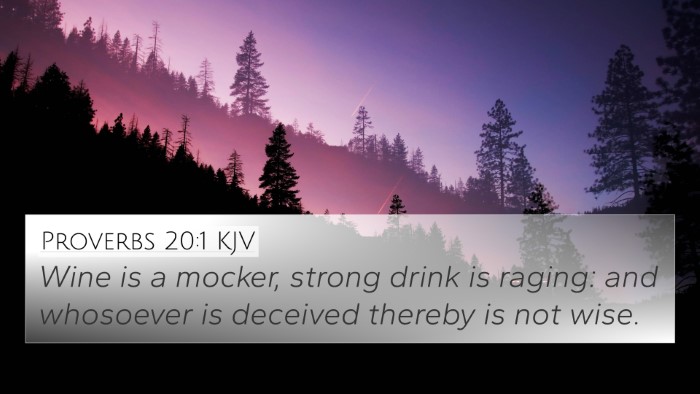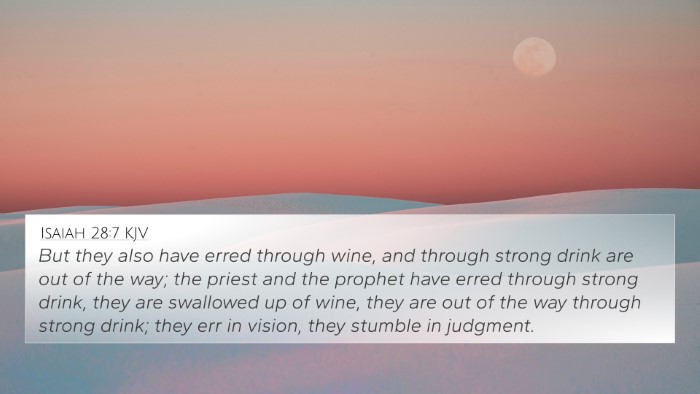Understanding Proverbs 31:4
Proverbs 31:4 states, "It is not for kings, O Lemuel, it is not for kings to drink wine; nor for princes strong drink." This verse is part of the teachings of King Solomon, addressing Lemuel, likely a reference to Solomon himself or another king, emphasizing the moral and ethical responsibilities of leaders.
Summary of Proverbs 31:4 Meaning
The verse draws attention to the dangers of indulgence in wine and strong drink for those in positions of power. Here, God's guidance through wisdom is crucial for a king who must govern with clarity and fairness. Both Albert Barnes and Matthew Henry suggest that rulers must remain sober-minded and self-controlled to avoid poor judgments that could lead to the oppression of the people.
Insights from Public Domain Commentaries
-
Matthew Henry: Henry argues that this verse cautions against the influence of alcohol, which can cloud judgment and lead to moral failure, highlighting the importance of a ruler's integrity and the necessity for wise governance.
-
Albert Barnes: Barnes adds that the verse serves as a warning against the pitfalls of luxury and indulgence that might accompany nobility, stressing that true leadership involves responsibility and the need for temperance.
-
Adam Clarke: Clarke suggests that the emphasis on abstaining from strong drink is a reflection of the high standards required of those who lead others, indicating that leaders should be examples of righteousness and self-discipline.
Cross-References with Proverbs 31:4
Proverbs 31:4 can be connected to a variety of other scriptural references that underline the themes of sobriety and responsible leadership. Below are notable cross-references:
- Proverbs 20:1: "Wine is a mocker, strong drink is raging: and whosoever is deceived thereby is not wise." - A direct warning against the folly of excessive drinking.
- 1 Timothy 3:2-3: "A bishop then must be blameless... not given to wine..." - This verse outlines the qualifications for church leadership, reflecting similar principles of temperance.
- Titus 1:7: "For a bishop must be blameless, as the steward of God; not self-willed, not soon angry, not given to wine..." - Similar to the previous verse, reinforcing the requirement of self-control.
- Proverbs 23:30-31: "They that tarry long at the wine; they that go to seek mixed wine..." - Warns of the dangers of excessive drinking, resonating with the message in Proverbs 31:4.
- Isaiah 28:7: "But they also have erred through wine, and through strong drink are out of the way..." - Highlights the detrimental effects of alcohol on judgment.
- Luke 21:34: "And take heed to yourselves, lest at any time your hearts be overcharged with surfeiting, and drunkenness..." - A New Testament admonition about the consequences of indulgence.
- Proverbs 31:5: "Lest they drink, and forget the law, and pervert the judgment of any of the afflicted." - The following verse closely ties into the theme, emphasizing the role of sober judgment in civic responsibility.
- Ecclesiastes 10:17: "Blessed art thou, O land, when thy king is the son of nobles, and thy princes eat in due season, for strength, and not for drunkenness!" - Contrasts wise leadership with reckless behavior, enhancing the message of Proverbs 31:4.
Thematic Connections and Interpretations
The overarching themes found in Proverbs 31:4 elevate the importance of temperance and clear-mindedness among leaders. Both the Old and New Testaments emphasize the necessity for those in authority to lead with wisdom and righteousness. These principles are echoed in various scriptures that discuss the qualities and responsibilities of leaders.
Scriptural Cross-Referencing as a Study Tool
When studying the Bible, particularly through cross-referencing, one can gain deeper insights into how different verses connect to form a cohesive understanding of scriptural principles. The tools for Bible cross-referencing, such as a Bible concordance and cross-reference Bible study materials, become essential in navigating these connections.
How to Use Bible Cross-References
To effectively use Bible cross-references, follow these steps:
- Identify key themes: Focus on key concepts or words from the verse you are exploring.
- Consult a Bible concordance: Use a concordance to find related verses that contain similar themes or terms.
- Compare interpretations: Read comments and analyses from various scholars to see different perspectives.
- Engage in comparative studies: Investigate how similar verses speak on the same topic or theme to enrich your understanding.
Conclusion
Proverbs 31:4 provides a profound insight into the nature of leadership and the moral responsibilities that accompany power. By cross-referencing with other scriptures, one can uncover a rich tapestry of guidance on living a life of integrity and sound judgment. The continual dialogue between these texts fortifies the wisdom found in the Bible, illustrating that the principles of righteousness are timeless and universally applicable.















